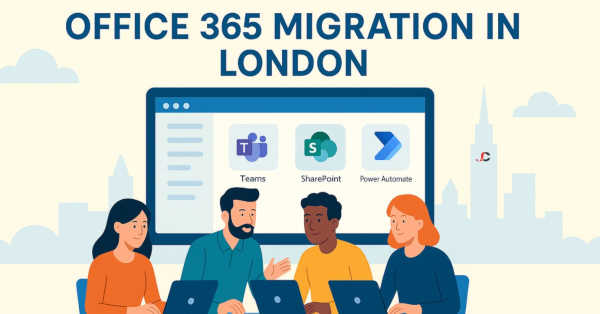Driving digital innovation, an Office 365 migration in London is a vital step for local small to medium-sized businesses (SMBs) aiming to streamline their operations. However, the real value of this transition is unlocked after the migration is complete. Post-migration success depends on how effectively companies adapt, optimise, and secure their use of Microsoft 365 services. This article explores key strategies to help London SMBs get the most out of their investment following their Office 365 migration.
Make Microsoft Teams Central to Communication
Once your Office 365 migration in London is complete, Microsoft Teams should become the central hub for internal collaboration. Teams enables real-time communication, file sharing, and project coordination all in one platform.
- Connect with other Microsoft 365 tools such as SharePoint and OneDrive for a unified experience.
- Create structured teams and channels to avoid message sprawl and improve team focus.
- Utilise Teams Calling and Meetings to replace outdated conferencing tools with reliable, cloud-based communication solutions.
By fully leveraging the capabilities of Teams post-migration, London small to medium-sized businesses (SMBs) can expect a significant boost in productivity and a more collaborative work environment.
Streamline Workflows with Power Automate
A successful Office 365 migration in London lays the foundation for process automation. Microsoft Power Automate enables businesses to automate repetitive tasks, reduce human error, and improve consistency.
- Automate document approvals, data collection, and notifications to streamline processes.
- Integrate with third-party applications such as Salesforce, Dynamics 365, or Slack.
- Monitor and adjust flows regularly for ongoing optimisation.
By incorporating Power Automate into everyday operations, businesses can modernise their workflows and free up resources for higher-value activities.
Prioritise Staff Training and Digital Adoption
Migrating to Office 365 is not enough—staff must be trained to utilise its tools fully. Many small to medium-sized businesses (SMBs) in London underestimate the need for digital adoption after migration.
- Offer interactive training sessions that focus on the practical use of Outlook, OneDrive, Teams, and SharePoint.
- Create a digital champions network to support peer learning within your business.
- Provide on-demand resources, such as short videos, intranet articles, or a Q&A knowledge base, to support users.
A successful Office 365 migration in London includes empowering staff with the knowledge to use the platform efficiently and confidently.
Strengthen Security Post-Migration
Security is a critical concern following an Office 365 migration in London, especially with increased remote access to business data.
- Enable Multi-Factor Authentication (MFA) for all accounts to reduce the risk of breaches.
- Use Microsoft Defender for Office 365 to detect phishing, malware, and unsafe links.
- Establish compliance and retention policies within the Microsoft Purview Compliance Portal.
- Regularly audit user activity and permissions to ensure secure access management.
These measures ensure that the benefits of cloud collaboration do not come at the expense of data security.
Define Clear Collaboration and Data Governance Policies
Post-migration, many businesses face issues such as data duplication, oversharing, or inefficient file management. These can be avoided by establishing clear collaboration rules.
- Set governance policies for SharePoint libraries, Teams usage, and OneDrive sharing.
- Implement naming conventions for files, folders, and Teams channels.
- Restrict external sharing and monitor guest access to reduce data leakage risks.
By taking a proactive stance, London SMBs can maintain control and organisation after completing their Office 365 migration.
Evaluate Ongoing Usage and Return on Investment
Migrating to the cloud should deliver tangible business benefits. Regularly assessing how Office 365 is being used will help determine if your Office 365 migration in London is providing the expected value.
- Use Microsoft 365 usage analytics to identify underused apps and features.
- Monitor team experiences to identify common concerns and refine your ongoing training strategy.
- Plan future enhancements, such as advanced licensing (e.g., E5) or third-party integrations, based on real usage patterns.
Sustained success with Microsoft 365 stems from adapting and improving its use over time.
Understand the Real Office 365 Migration Cost
While the upfront Office 365 migration cost may be a one-time investment, ongoing success depends on ongoing optimisation. Budgeting for training, support, and security tools post-migration ensures your cloud investment is protected and maximised.
- Factor in third-party migration tools, training services, and support contracts.
- Budget for future licensing upgrades as your business scales.
- Track ROI via reduced downtime, increased productivity, and improved collaboration.
Choosing trusted Office 365 migration services in London can help you maintain control over long-term costs.
Conclusion
An Office 365 migration in London is not just a technical project—it's a strategic move that requires ongoing attention after the migration is complete. By focusing on collaboration, automation, training, security, and governance, London small and medium-sized businesses (SMBs) can unlock the full value of their Microsoft 365 investment. A successful migration is measured not just by the data moved, but by the transformation that follows.
Frequently Asked Questions
Q1: What is the most crucial step after an Office 365 migration in London?
A1: Effective use of Microsoft 365 starts with comprehensive training and is sustained through strong collaboration and security frameworks.
Q2: How long does it take to realise value after migration?
A2: Most London small to medium-sized businesses (SMBs) begin to see productivity improvements within weeks, provided they invest in training and automation early on.
Q3: Are there hidden costs in an Office 365 migration in London?
A3: Yes, costs such as post-migration support, user training, and ongoing licensing upgrades should be considered in addition to the initial migration price.
Q4: What security features should be activated post-migration?
A4: Features like Multi-Factor Authentication (MFA), Microsoft Defender, and conditional access policies should be prioritised to secure data.
Q5: Can Office 365 be customised for different departments?
A5: Absolutely. Teams, SharePoint sites, and workflows can be tailored to meet the specific needs of departments like HR, Sales, or Finance.





Comments